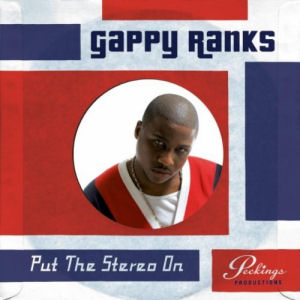London-born reggae artist Gappy Ranks is currently on tour promoting his solo debut “Put the Stereo On.” In this conversation with RapReviews.com contributor Jack M Silverstein, Ranks talks about the power of music to unite generations, bring nations together, and cheer us during our saddest times.
JMS: How does it affect you when you enter a project, knowing that it’s all on you as opposed to having a band?
GR: Being in a group, you have to share problems. My problems have to be your problems, and your problems have to be my problems. We went into the group kind of young. We were just happy and excited about making music, but I have more to offer than 16 bars and eight bars. I’ve always thought I have. Not in any selfish way. I’ve always wanted to pursue a solo career. That was just an avenue. You know, I love being in the studio. I’m also an engineer. I learn from being in the crew. I was the engineer for the crew also. The change is not different, because you have to do the music by yourself, which I was doing all the time anyway.
Coming from London, which is so multi-cultural, I incorporate that into the reggae music I do today. I always kind of knew what the people wanted to hear. Just communicating from my experiences, and their experiences.
Obviously there is a lack of sales because of the internet, but I use this to my ability. You know, social networking. By one press of a button, the world can hear Gappy Ranks. We’re doing this interview right now through Skype. I embrace all of the new technology and the way the game is going. Everything’s not going to go your way, but you have to adapt to it and make it beneficial to what you’re doing.
JMS: What excites you most about the music on this new album?
GR: There’s nothing like it right now. It stands alone as a studio album. Just to see the people from all around the world, young and old, embracing this album. I call it ‘Put the Stereo On’ because I remember every day was a working day for my parents, and me and my siblings were at school. But Sunday, my father would play songs and bring the family together, even at the saddest times. It doesn’t matter what music you’re listening to, or what culture you’re coming from – I’m sure everyone can relate to that, when music was playing in your household, bringing everyone together.
This is what the album is about: bringing generations together. I’m only in my mid-20s, so hopefully the elders can understand, “This young guy, he’s singing on rhythms from before he was born.” It shows that I can understand them, so hopefully they can understand me. I bring generations together, and that’s what music is about. Bringing generations together, and communicating with all walks of life.
Reggae music has influenced the hip-hop we love today, the dancehall of today. Most of the modern music we have today is influenced by this genre. I’m just doing what I know how to do, which is simple. When I go onto a hip-hop track or I go onto a pop track, it’s simple because of the same basic laws reggae music have provided. Reggae music has touched people all around the world, whether you don’t speak the language. It’s unconscious, where they don’t even understand what I’m saying, but the response is tremendous because they can feel the music. That’s what music is about. It’s emotional. And if you can relate to people on emotional levels – whether it be sad, happy, angry, whatever you like – that’s the job being done.
Me going onto other genres will educate people about reggae music. People that have never heard about reggae music. They hear Gappy Ranks on a hip-hop track, and maybe they like that track and go back to listen to some reggae music, and embrace reggae music. We can’t always expect people to come and listen to reggae music. Sometimes we have to bring the reggae to them. And that’s what Gappy Ranks is doing.
Reggae music has always been for people who have been oppressed. People who have had a hard life. I’m coming from that. We’re living in an oppressed world, you know? Stress is one of the biggest diseases out there right now, and, I can quote from Bob Marley: “When music hits, you feel no pain.” Reggae is one of those types of music. It can tame the beast.
JMS: Talking about living in an oppressed world, and using music to maybe solve some problems, how strong an ability do you think music has to really solve problems, and your music in particular?
GR: How did you learn your alphabet? It was in a musical form in school. (Singing) A, B, C, D, E, F, G. Music is the biggest form of communication. I’m bigger than any telecommunication network, any TV broadcasting. I sing music, and it hits everybody. It’s not only me. I always say that music is the biggest form of communication. No matter how you like it, music has always been there and will always be there. Listen to when the birds sing in the morning. They’re communicating. We’re talking right now. We’re communicating. I never said it’s the only way of communication, but the biggest form.
I’m happy to be making music. Maybe not reaching everybody. I’m not perfect, you know. I’m not saying people should live like me and listen to everything I say. But if people can relate to me, I’m doing the job. And that’s what music is about.

